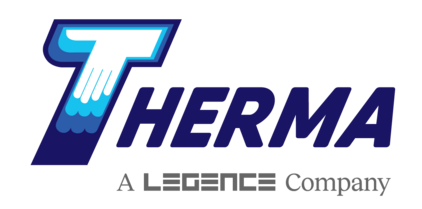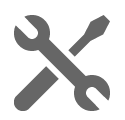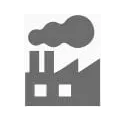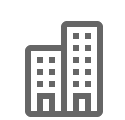By Donna Rider
Industrial Control Convergence is a worldwide trend that has started Industry 4.0, the fourth industrial revolution, using the automation of existing technology and the cutting-edge concept of IoT (Internet of Things). Separate technologies such as sensors, PCs, IPCs, PLCs and other Industrial Controllers will converge into a cohesive whole with artificial intelligence-like(AI) precision to enhance automation within commercial industries. This will help gain insights into industry efficiency, performance and productivity.
This quote from Walt Disney says it all:
“In this volatile business of ours, we can ill afford to rest on our laurels, even to pause in retrospect. Times and conditions change so rapidly that we must keep our aim constantly focused on the future.”
What Is Industrial Control Convergence?
Industrial Control Convergence is a new trend that will automate most commercial processes through the networking and software linking of multiple devices, tools and controllers. There are a wide range of sensors and other devices available that can gather enormous amounts of information.
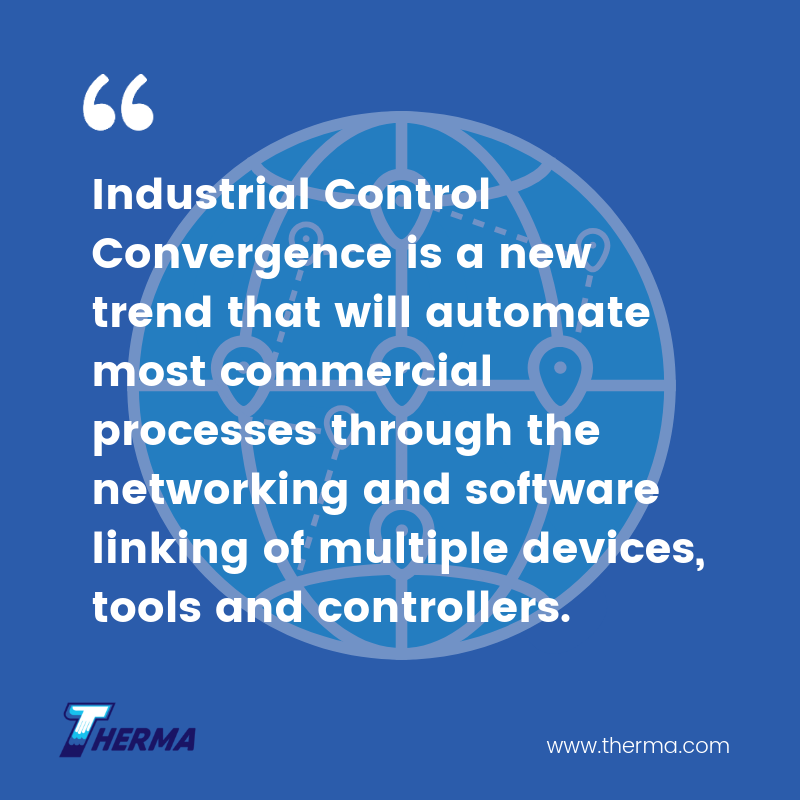
The concept of Industrial Control Convergence makes this data retrievable for analysis. We are already seeing some of this technology with robots in manufacturing plants. In many industries, sensors and controllers are used to tell a machine where to go and what actions to perform. The convergence concept links these robots to the network so that information can be gathered in real-time.
Here are some examples:
- Production environments can gather information about inventory usage, product count and other useful data.
- HVAC systems use different types of sensors to gather information about the interior and exterior climate changes, then PCs, PLCs and IPCs control heating, cooling and ventilation systems in response to the sensor information.
- Many types of sensors are already in place gathering information, so why not store, analyze and use that information to improve production, efficiency and performance?
Why Is Industrial Control Convergence Technology Being Developed?
The uploading of information through IoT makes all the collected data available for analysis that can find efficiency gaps, material waste, keep track of production material and performs tasks using a wide range of other useful metrics.
Industrial Control Convergence will reduce reaction time, speed productivity and reduce cost. Much of the technology may already be in place, such as sensors, PCs, IPCs, PLCs, other Industrial Controllers, internal networks and communication devices. Convergence is the next step to connecting all these components to control and optimize the work environment for the future.
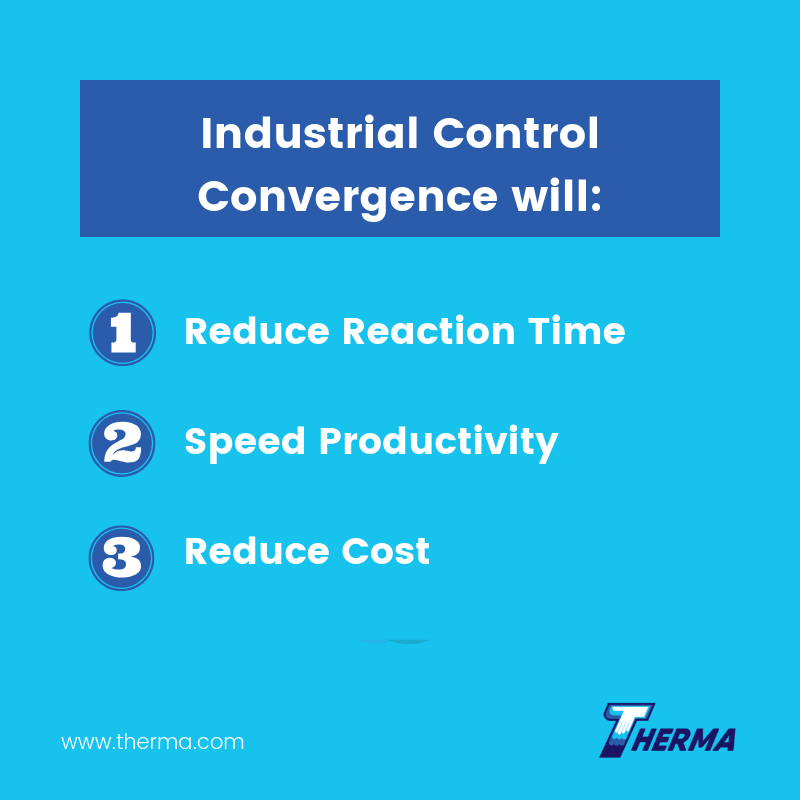
For example, when a problem is detected within a system, the system can immediately shut down or take action to prevent problems such as damage to the system, personnel hazards or environmental issues. When an alert is sent through the network that a problem was found and action taken, the information gathered just prior to the shutdown will indicate where the problem occurred and what action was taken. This will reduce the amount of time to fix the issue and be back in business.
Reducing downtime, eliminating waste and protecting employees makes it all cost-efficient.
Convergence Will Support Better Information
Businesses rely on communication and information to run effectively and efficiently. The convergence concept will add more technical information and timely communication to assist with decision making.
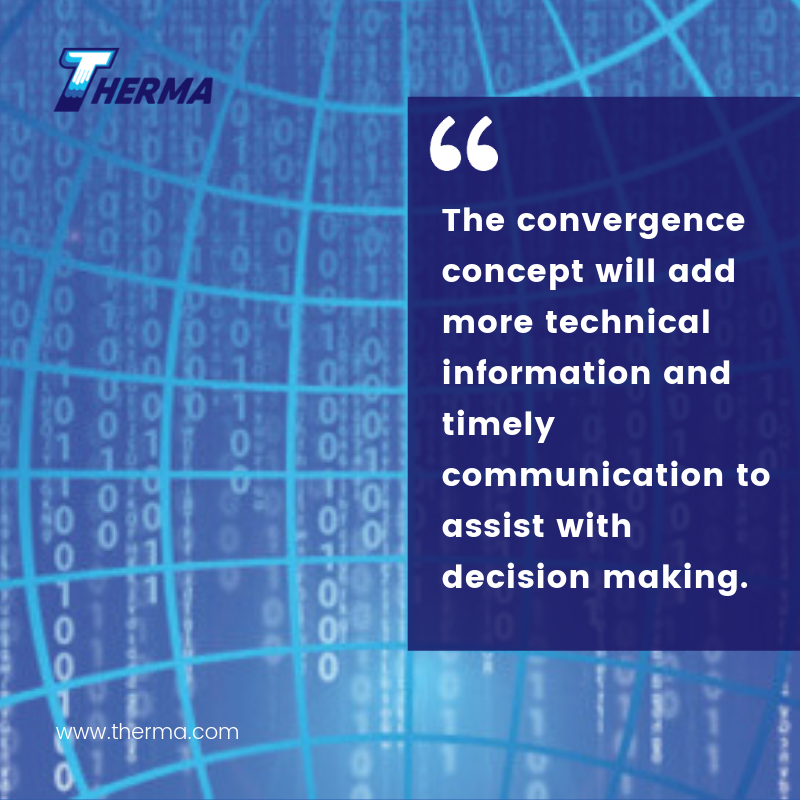
In addition to allowing cutting down on production costs and employee time, Industrial Control Convergence, through networking previously standalone machines, will provide real-time feedback, taking the industry to the next level and into the future. This feedback will help improve reaction time, time-lapses and other inconsistencies that were invisible before.
This enormous amount of data, called big data, will be too much to be analyzed by normal spreadsheets, but it must be dealt with to improve processes, performance and efficiency. Having real-time data is a must to stay competitive in today’s market.
Therma Can Help You Make Informed Decisions
Therma has over 50 years of experience providing high-quality, price-sensitive solutions to tailor build automaton systems to your specific needs. We work with multiple protocols and offer in-house programming capabilities. We link intelligent devices into a common platform that enables you to optimize your building’s performance. We provide expert consultation and installation guidance to take you into the future.
Let the experts at Therma assist you with your Industrial Control Convergence questions.
Biography
Donna Rider is a Technical Writer with more than 18 years experience researching, developing, managing, and producing on-line documentation and training videos. Ms. Rider gained her expertise in technical writing during her highly successful career in several leadership roles. Specifically, Ms. Rider wrote technical documents to assist the Help Desk Technicians troubleshoot calls from customers at Gateway and Wells Enterprises.
Sources:
- https://developer.ibm.com/articles/iot-key-concepts-skills-get-started-iot/
- https://en.m.wikipedia.org/wiki/Industry_4.0
- https://www.controleng.com/articles/convergence-brings-new-benefits-to-the-industrial-controls-world/
- https://www.iotw orldtoday./2019/04/05/the-next-chapter-for-the-iot-network-convergence/
- https://info.panelshop.com/blog/benefits-of-industrial-control-convergence
- https://www.therma.com/?s=ipcs
- https://www.controleng.com/articles/convergence-brings-new-benefits-to-the-industrial-controls-world/
- https://technology.ihs.com/549848/convergence-trends-reshape-the-future-of-industrial-controls
- https://www.therma.com/pros-vs-cons-of-implementing-iot-programs-in-your-facility/
- https://people.eecs.berkeley.edu/~culler/cs294-f09/m197content.pdf
- https://en.wikipedia.org/wiki/Sensor
- https://en.wikipedia.org/wiki/Big_data
- https://www.stratus.com/stratus-blog/the-four-benefits-of-an-ot-it-convergence/
- https://www.geautomation.com/industrial-internet
- https://en.m.wikipedia.org/wiki/Big_data
